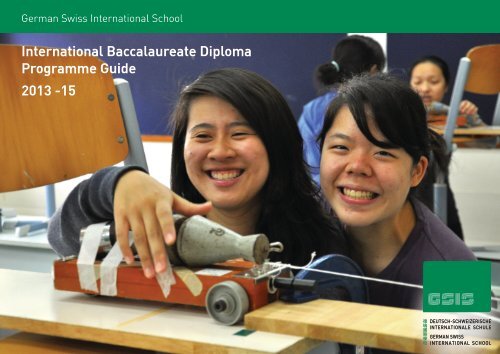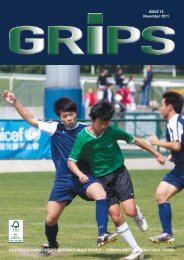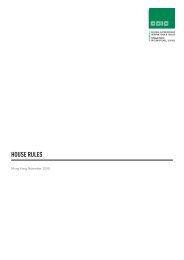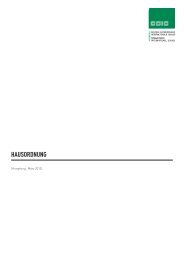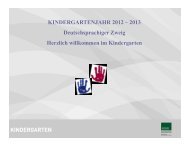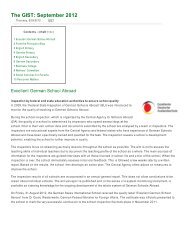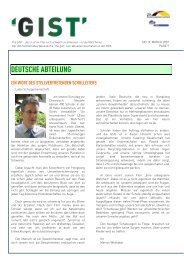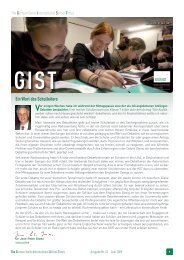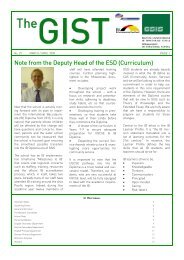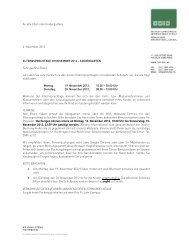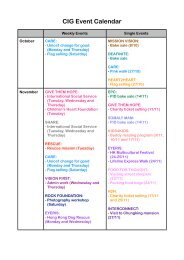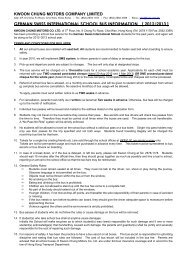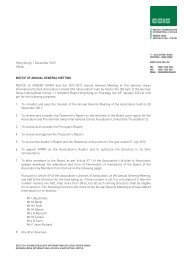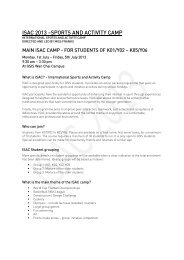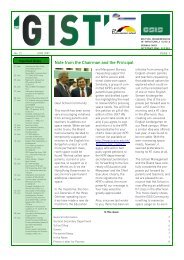to download document as PDF. - German Swiss International School
to download document as PDF. - German Swiss International School
to download document as PDF. - German Swiss International School
You also want an ePaper? Increase the reach of your titles
YUMPU automatically turns print PDFs into web optimized ePapers that Google loves.
2 Y12/13 Options Booklet
Contents<br />
Glossary ........................................................................................................................................................................................ 4<br />
Introduction ................................................................................................................................................................................... 5<br />
Subjects offered at <strong>German</strong> <strong>Swiss</strong> <strong>International</strong> <strong>School</strong> .............................................................................................................. 6<br />
Overview of Subject Options ......................................................................................................................................................... 9<br />
The Core ........................................................................................................................................................................................ 9<br />
Group One: Studies in Language and Literature ........................................................................................................................ 10<br />
Group Two: Language Acquisition .............................................................................................................................................. 11<br />
Group Three: Individuals and Societies ...................................................................................................................................... 14<br />
Group Four: Experimental Sciences ........................................................................................................................................... 18<br />
Group Five: Mathematics ............................................................................................................................................................ 23<br />
Group Six: Creative Arts ............................................................................................................................................................. 24<br />
Who <strong>to</strong> Contact ............................................................................................................................................................................ 27<br />
Y12/13 Options Booklet 3
Glossary<br />
EE EXTENDED ESSAY<br />
HL HIGHER LEVEL<br />
SL STANDARD LEVEL<br />
CAS<br />
IBO<br />
CREATIVITY<br />
ACTION<br />
SERVICE<br />
INTERNATIONAL BACCALAUREATE<br />
ORGANISATION<br />
TOK THEORY OF KNOWLEDGE<br />
IA INTERNAL ASSESSMENT<br />
EA EXTERNAL ASSESSMENT<br />
4 Y12/13 Options Booklet<br />
A 4000 word independent research paper submitted by diploma students.<br />
Students formulate an argument, research <strong>to</strong> support their argument and<br />
reach a conclusion.<br />
Designates a course that is 240 hours. Three academic subjects must be<br />
taken at higher level.<br />
Designates a course that is no less than 150 hours in length. Three<br />
academic subjects must be taken at standard level.<br />
Students must plan and participate in activities outside the cl<strong>as</strong>sroom that<br />
cover the three are<strong>as</strong> of the programme: Creativity, Action, and Service. This<br />
is completed throughout the two years of the programme.<br />
IB Organization <strong>as</strong> a whole, with offices in Geneva, New York, Vancouver,<br />
Cardiff, and Singapore. Contact www.ibo.org.<br />
A required component of the core of the programme. Students explore the<br />
b<strong>as</strong>is for knowledge and judgment.<br />
Evaluative work (presentations, oral interviews, papers, etc.) which is<br />
<strong>as</strong>sessed internally using IBO criteria. External examiners then moderate<br />
the IA.<br />
Work <strong>as</strong>sessed by examiners and modera<strong>to</strong>rs of the IB Organization. Work<br />
is sent <strong>to</strong> examiners in over 100 different countries.<br />
IBDP INTERNATIONAL BACCALAUREATE DIPLOMA PROGRAMME A two year pre-university curriculum, which GSIS h<strong>as</strong> adopted for Y12-Y13<br />
LP LEARNER PROFILE<br />
The list of ten attributes <strong>to</strong> be developed by students throughout the course<br />
of their education at GSIS and beyond<br />
CORE The three central elements of the diploma: ToK, CAS, EE
Introduction<br />
At GSIS, we strive <strong>to</strong> enable our students <strong>to</strong> access opportunities that will see them grow in<strong>to</strong> balanced, intelligent, global citizens.<br />
The programme of study in Y12-Y13 is the <strong>International</strong> Baccalaureate Diploma Programme (IBDP). A student taking the IBDP must follow the Core of<br />
the programme and take six subjects, one each from six subject groups.<br />
The Core of the programme h<strong>as</strong> three parts:<br />
1<br />
2<br />
3<br />
Theory of Knowledge (ToK)<br />
Creativity, Action and Service (CAS)<br />
Extended Essay (EE)<br />
The Six Subject Groups are:<br />
1<br />
2<br />
3<br />
4<br />
5<br />
6<br />
Studies in Language and Literature<br />
Language Acquisition<br />
Individuals and Societies<br />
Experimental Science<br />
Mathematics<br />
The Arts, or a second subject from one of the other groups.<br />
Three of these subjects are taken at the more demanding HL, three at SL. This reflects the IBDP’s balance between depth and breadth. The table below<br />
reflects the are<strong>as</strong> of study in Y7-Y11 which link <strong>to</strong> the subject groups in the Diploma.<br />
I/GCSE English Modern foreign<br />
language<br />
IBDP Group 1<br />
Studies in<br />
Language and<br />
Literature<br />
Economics<br />
Geography<br />
His<strong>to</strong>ry<br />
ICT<br />
Biology<br />
Chemistry<br />
Physics<br />
Mathematics Art<br />
Drama<br />
Music<br />
<br />
Group 2<br />
Language<br />
Acquisition<br />
Group 3<br />
Individuals and<br />
Societies<br />
Group 4<br />
Experimental Sciences<br />
including Computer<br />
Science<br />
Group 5<br />
Mathematics<br />
Group 6<br />
Creative Arts or<br />
Elective subject<br />
Y12/13 Options Booklet 5
Subjects offered at <strong>German</strong> <strong>Swiss</strong> <strong>International</strong> <strong>School</strong><br />
Group 1 - Language A:<br />
Studies in Language and Literature<br />
Group 2 - Language B:<br />
Language Acquisition<br />
Group 3<br />
Individuals and Societies<br />
Group 4<br />
Experimental Sciences<br />
Group 5<br />
Mathematics<br />
Group 6<br />
Creative Arts or<br />
Elective subject<br />
*These subjects are only offered in Y12/13. All students welcome <strong>to</strong> apply.<br />
6 Y12/13 Options Booklet<br />
English Literature HL/SL<br />
English Language and Literature HL/SL<br />
<strong>German</strong> B HL/SL<br />
Chinese B HL/SL<br />
French B HL/SL<br />
*French Ab Initio SL<br />
Information Technology in a Global Society (ITGS) HL/SL<br />
Economics HL/SL<br />
Geography HL/SL<br />
*Social and Cultural Anthropology (SCA) HL/SL<br />
His<strong>to</strong>ry HL/SL<br />
Biology HL/SL<br />
Chemistry HL/SL<br />
Physics HL/SL<br />
*Computer Science HL/SL<br />
Mathematics HL<br />
Mathematics SL<br />
Maths Studies SL<br />
Music HL/SL<br />
Visual Arts HL/SL<br />
Theatre Studies HL/SL<br />
A second Group 3 subject or<br />
A second Group 4 subject
IBDP Assessment and Moderation Procedures<br />
IBDP <strong>as</strong>sessment procedures are designed <strong>to</strong> emph<strong>as</strong>ize process rather than content and <strong>to</strong> achieve a balanced <strong>as</strong>sessment of a candidate’s<br />
performance. Various <strong>as</strong>sessment methods are used in order <strong>to</strong> take in<strong>to</strong> account different learning styles and cultural experiences, ensuring that all<br />
students have the opportunity <strong>to</strong> demonstrate their abilities. Conventional external examinations are complemented by internal <strong>as</strong>sessment conducted<br />
by teachers. The method of subject <strong>as</strong>sessment is defined with reference <strong>to</strong> specific <strong>as</strong>sessment criteria and will consist of some or all of the following:<br />
External Assessment: Written Examinations<br />
These may include essays and short answer questions, <strong>document</strong> and data b<strong>as</strong>ed questions, comprehension exercises.<br />
Oral Examinations<br />
These are conducted according <strong>to</strong> procedures established by the IBO<br />
Internal Assessment<br />
According <strong>to</strong> the requirements of the subject, this may take the form of guided coursework, project work, field work, practical and/or labora<strong>to</strong>ry work<br />
All internal <strong>as</strong>sessment is subject <strong>to</strong> external moderation by the IBO, which is rigorously conducted and reported<br />
The Core<br />
The EE and ToK essay are externally <strong>as</strong>sessed<br />
The ToK oral presentation is internally <strong>as</strong>sessed<br />
CAS is designed and implemented by the school and all activities are moni<strong>to</strong>red internally<br />
Up <strong>to</strong> three points may be added <strong>to</strong> the <strong>to</strong>tal score awarded for individual subjects, b<strong>as</strong>ed on a combined score from the EE and ToK <strong>as</strong>sessments. A<br />
candidate who writes a good EE and whose performance in ToK is judged <strong>to</strong> be satisfac<strong>to</strong>ry will be awarded +1 point. A candidate who fails <strong>to</strong> complete<br />
the requirements of EE and ToK will be awarded no points and will not be awarded the diploma.<br />
Awarding of the IBDP<br />
The grading scheme for the IBDP is a 1 <strong>to</strong> 7 scale, where 7 is an excellent performance. The IBDP will be awarded <strong>to</strong> candidates whose <strong>to</strong>tal score<br />
reach or exceed 24 points. Apart from this simple condition there are 19 fail codes that can be found at www.ibo.org<br />
The IBDP cannot be awarded, whatever the score, <strong>to</strong> candidates who have not submitted an EE, not followed a course in ToK and not engaged in CAS<br />
activities.<br />
Y12/13 Options Booklet 7
Higher Education<br />
The Careers Department is available <strong>to</strong> help guide students through the processes of applying <strong>to</strong> universities worldwide. We can also guide students<br />
in their choice of HL/SL subjects in relation <strong>to</strong> university prerequisites. It is important <strong>to</strong> remember, even at I/GCSE level that students should keep<br />
their options open and do the subjects that they enjoy and in which they excel. Regarding science courses, universities like the breadth that the IBDP<br />
gives students and this will be a huge <strong>as</strong>set for most courses. However, if you are thinking of studying Medicine, Engineering, or Natural Sciences then<br />
students should choose appropriate science subjects: Chemistry and Biology for Medicine; Physics, Mathematics and Chemistry for Natural Sciences;<br />
and Physics and Mathematics for Engineering. Regarding the arts and humanities, if students are applying for Law it is good <strong>to</strong> have at le<strong>as</strong>t one<br />
humanity at HL. Most departments of Law really like students <strong>to</strong> have studied His<strong>to</strong>ry or Geography, a modern language and another subject, even<br />
Mathematics at HL. To study modern languages, it is usually a good idea <strong>to</strong> try <strong>to</strong> have a good knowledge of at le<strong>as</strong>t two languages. In general terms,<br />
there is a lot more flexibility in the arts and humanities <strong>as</strong> very few courses have strong vocational links. For many degree courses universities like<br />
students <strong>to</strong> have a breadth of experience academically, presenting with a mix of arts, humanities, sciences and mathematics. The IBDP is designed <strong>to</strong><br />
give students this breadth. It is important, however, that students consult the Careers Department about the choice of HL subjects, especially if they are<br />
thinking about a specific career.<br />
It is a good idea <strong>to</strong> b<strong>as</strong>e selection of subjects on the following:<br />
Academic interest<br />
Personal interests, skills and aptitudes<br />
Entry requirements for degree courses or careers<br />
Ple<strong>as</strong>e do not forget that the Careers Department is there <strong>to</strong> guide students through the process of preparing for and applying <strong>to</strong> university. We give<br />
students a great deal of one <strong>to</strong> one advice and look forward <strong>to</strong> working with students and parents.<br />
8 Y12/13 Options Booklet
Overview of Subject Options<br />
The Core<br />
Theory of Knowledge (ToK)<br />
This is a 100 hour timetabled course, which is compulsory for all IBDP students. The course critically examines the types, nature and limitations of<br />
the different ways of knowing and are<strong>as</strong> of knowledge. In the process, students consider the role of language, re<strong>as</strong>on, emotion and perception in the<br />
pursuit of certainty and truth. Students and teachers are given opportunities <strong>to</strong> consider the role and nature of knowledge in their own culture, in the<br />
cultures of others and in the wider world. This enables students <strong>to</strong> be aware of themselves <strong>as</strong> thinkers, encouraging them <strong>to</strong> become more acquainted<br />
with the complexity of knowledge and the ability <strong>to</strong> recognize the need <strong>to</strong> act responsibly in an incre<strong>as</strong>ingly interconnected but uncertain world. Texts<br />
and examples come from a wide range of cultural perspectives and knowledge are<strong>as</strong>, including human and social sciences, mathematics, the arts,<br />
politics, religion and ethics. Students are <strong>as</strong>sessed by means of a written essay and an oral presentation. Up <strong>to</strong> 3 points can be awarded for this work in<br />
combination with the Extended Essay.<br />
Extended Essay (EE)<br />
The EE is an in-depth study of a limited <strong>to</strong>pic within a subject area. The 4000-word essay provides students with the opportunity <strong>to</strong> conduct independent<br />
research at an introduc<strong>to</strong>ry level. Students are introduced <strong>to</strong> the EE process in November of Y12. Students will need <strong>to</strong> choose an area of interest<br />
related <strong>to</strong> their current studies and in relation <strong>to</strong> future <strong>as</strong>pirations. When students have chosen their subject area for the EE, they discuss the<br />
proposed <strong>to</strong>pic with their supervisor. As an independent piece of research, it is critical that students are self-disciplined and adhere <strong>to</strong> all deadlines.<br />
The completed essay is submitted <strong>to</strong> the supervisor and <strong>to</strong> the IB Coordina<strong>to</strong>r in September of Y13.<br />
Creativity, Action and Service (CAS)<br />
CAS encourages students <strong>to</strong> be involved in meaningful activities that will make a significant difference in their lives and the lives of others. It challenges<br />
them <strong>to</strong> participate in activities they may not have previously considered. The emph<strong>as</strong>is is on learning outside the cl<strong>as</strong>sroom in real life situations. CAS<br />
is a compulsory part of the core of the IBDP, and is supported by the many years of commitment GSIS students have given in all three are<strong>as</strong> of CAS.<br />
The process involves students planning and then completing activities, over an 18-month period, with ongoing reflection. Showing evidence of the CAS<br />
criteria is integral <strong>to</strong> completing the programme successfully. GSIS students will be expected <strong>to</strong> commit <strong>to</strong> a sustainable project, either individually<br />
or in a group, and be involved in at le<strong>as</strong>t one international project. On average students will be expected <strong>to</strong> be involved in their CAS activities for three<br />
hours per week, with a re<strong>as</strong>onable balance given <strong>to</strong> each of the three are<strong>as</strong> of creativity, action and service.<br />
Y12/13 Options Booklet 9
Group One: Studies in Language and Literature<br />
Literature HL/SL<br />
Literature develops students’ understanding of the techniques involved in literary criticism and encourages the ability <strong>to</strong> form independent literary<br />
judgements. This includes an appreciation of and informed personal response <strong>to</strong> literature in English in a range of texts in different forms and from<br />
different periods and cultures. The course also encourages the skills of reading, analysis and communication, in both written and oral forms. Students<br />
will develop an understanding of the ways in which writers’ choices of form, structure and language shape meanings, and will develop the ability<br />
<strong>to</strong> produce informed, independent opinions and judgements on literary texts. Texts will be chosen from a range of genres and will include works in<br />
translation. Students at both levels will be expected <strong>to</strong> read extensively, and <strong>to</strong> work independently. At SL students will study ten texts, and at HL, where<br />
a greater emph<strong>as</strong>is is placed on comparative literary analysis, thirteen texts are required.<br />
Assessment is by written examination (45%), written internal <strong>as</strong>sessment (25%) and oral presentations (30%).<br />
Language and Literature HL/SL<br />
The English Language and Literature course is a combination of the study of language and literature that presents students with the opportunity <strong>to</strong><br />
explore language <strong>as</strong> a dynamic process. Through the study of texts chosen from a variety of sources, genres and media, students develop an awareness<br />
and understanding of how meaning in language is created and shaped by culture and society. Students will learn how <strong>to</strong> read and think critically about<br />
the relationships between text, audience and purpose, <strong>as</strong> well <strong>as</strong> how language influences the individual’s view of the world.<br />
The appreciation of literary techniques and genre forms an important part of the course. Students will develop an understanding of the ways in which<br />
writers’ choices of form, structure and language shape meaning and learn how <strong>to</strong> express informed and independent opinions on literary texts orally<br />
and in writing. HL incorporates the study of six literary works and SL four works.<br />
Writing and speaking critically about language and literature will enable students <strong>to</strong> develop and refine their communication skills <strong>to</strong> become<br />
better readers, writers, speakers and thinkers, <strong>as</strong> well <strong>as</strong> develop cultural sensitivity. The course looks at language in cultural context and in m<strong>as</strong>s<br />
communication. The literature component covers both critical analysis and contextual studies. External <strong>as</strong>sessments consist of two end of course<br />
examinations (50%) and two written t<strong>as</strong>ks b<strong>as</strong>ed on materials studied (20%). Internal <strong>as</strong>sessment is an oral commentary (15%) and a further oral<br />
activity (15%).<br />
10 Y12/13 Options Booklet
Group Two: Language Acquisition<br />
Language B: <strong>German</strong>, Mandarin or French HL/SL<br />
Language B is an additional language-learning course designed for students with some previous learning of that language. The main focus of<br />
the course is on language acquisition and development of language skills. These language skills will be developed through the study and use of<br />
a range of written and spoken material. Such material will extend from everyday oral exchanges <strong>to</strong> literary texts, and are related <strong>to</strong> the culture(s)<br />
concerned. There is a common syllabus at SL and HL (with literature <strong>as</strong> an additional component of the HL course). The differences between levels<br />
are determined by the <strong>as</strong>sessment objectives, the depth and breadth of syllabus coverage, the <strong>as</strong>sessment details, the <strong>as</strong>sessment criteria, literature<br />
coverage and suggested teaching hours. The course aims <strong>to</strong>:<br />
Develop students’ intercultural understanding, awareness of the role of language in relation <strong>to</strong> other are<strong>as</strong> of knowledge and awareness of the<br />
relationship between the languages and cultures with which they are familiar<br />
Enable students <strong>to</strong> understand and use the chosen language of study in a range of contexts and for a variety of purposes<br />
Encourage an awareness and appreciation of the different perspectives of people from other cultures through the study of texts and through social<br />
interaction<br />
Provide students with a b<strong>as</strong>is for further study, work and leisure through the use of the language and the opportunity for enjoyment, creativity and<br />
intellectual stimulation<br />
Students will be <strong>as</strong>sessed on their ability <strong>to</strong>:<br />
Communicate clearly and effectively in a range of situations, demonstrating linguistic competence and intercultural understanding<br />
Use language appropriate <strong>to</strong> a range of interpersonal and/or cultural contexts<br />
Understand and use language <strong>to</strong> express and respond <strong>to</strong> a range of ide<strong>as</strong> with accuracy and fluency, analyse and respond <strong>to</strong> a range of written and<br />
spoken texts and use works of literature written in the target language of study (HL only).<br />
Organize ide<strong>as</strong> on a range of <strong>to</strong>pics, in a clear, coherent and convincing manner<br />
Y12/13 Options Booklet 11
12 Y12/13 Options Booklet<br />
Theme Example of Possible Topics Covered<br />
Core Communication and Media Advertising, Bi<strong>as</strong> in Media<br />
Global Issues Global Warming, Migration<br />
Social Relationships Language and Identity, Social Structures<br />
Options 2 options (chosen by the teacher)<br />
Cultural Diversity Beliefs, Values and Norms, Culinary Heritage<br />
Cus<strong>to</strong>ms and Traditions Celebrations and Social Events, Etiquette<br />
Health Diet and Nutrition, Drug Abuse<br />
Leisure Entertainment, Hobbies, Travelling<br />
Science and Technology Ethics and Science, Impact of IT on Society<br />
Literature For Higher Level Only - 2 works of literature (<strong>to</strong> be determined)<br />
Strong <strong>German</strong> HL students will be expected <strong>to</strong> take the Sprachdiplom II exam in Y13. This option is also open <strong>to</strong> SL students, whom the <strong>German</strong><br />
teachers judge <strong>to</strong> have the potential <strong>to</strong> reach this level.<br />
External Assessment (70%)<br />
Higher Level Standard Level<br />
25% Paper 1 (1 hour 30 minutes):<br />
Text-handling exercises on five written texts<br />
25% Paper 2 (1 hour 30 minutes):<br />
Section A: A t<strong>as</strong>k of 250–400 words, b<strong>as</strong>ed on the options, <strong>to</strong> be<br />
selected from a choice of five.<br />
Section B: Response of 150–250 words <strong>to</strong> a stimulus text,<br />
20% Written <strong>as</strong>signment:<br />
Creative writing of 500–600 words plus a 150-word rationale,<br />
b<strong>as</strong>ed on one of the literary texts read.<br />
Paper 1 (1 hour 30 minutes):<br />
Text-handling exercises on four written texts<br />
Paper 2 (1 hour 30 minutes):<br />
One writing exercise of 250–400 words from a choice of five, b<strong>as</strong>ed<br />
on the options.<br />
Written <strong>as</strong>signment:<br />
Inter-textual reading followed by a written exercise of 300–400<br />
words plus a 100-word rationale
Internal Examination (30%)<br />
20% Individual oral (8–10 minutes)<br />
15 minutes’ preparation time and a 10-minute presentation and discussion with the teacher.<br />
10% Interactive oral activity<br />
Three cl<strong>as</strong>sroom activities <strong>as</strong>sessed by the teacher.<br />
Y12/13 Options Booklet 13
Group Three: Individuals and Societies<br />
Economics HL/SL<br />
The study of economics is essentially about dealing with scarcity, resource allocation and the methods and processes by which choices are made in<br />
order <strong>to</strong> satisfy unlimited human wants. This course covers the economic theories of microeconomics, which deal with economic variables affecting<br />
individuals, firms and markets, and the economic theories of macroeconomics, which deal with economic variables affecting countries, governments<br />
and societies. These economic theories are not <strong>to</strong> be studied in a vacuum—rather, they are <strong>to</strong> be applied <strong>to</strong> real-world issues. The main <strong>to</strong>pical issues<br />
are fluctuations in economic activity, international trade, economic development and sustainability.<br />
This economics course encourages students <strong>to</strong> develop international perspectives, fosters a concern for global issues, and raises students’ awareness<br />
of their own responsibilities at a local, national and international level. The course also seeks <strong>to</strong> develop values and attitudes that will enable students<br />
<strong>to</strong> achieve a degree of personal commitment in trying <strong>to</strong> resolve these issues, appreciating our shared responsibility <strong>as</strong> citizens of an incre<strong>as</strong>ingly<br />
interdependent world. At the end of the course students will be able <strong>to</strong> demonstrate in-depth knowledge and critical understanding of a wide range<br />
of economic theories and concepts. They will be able <strong>to</strong> apply this knowledge and understanding <strong>to</strong> analyse both familiar and unfamiliar situations,<br />
issues and problems. They will be able <strong>to</strong> effectively evaluate evidence and arguments, make re<strong>as</strong>oned judgments and <strong>to</strong> present appropriate and<br />
well-supported conclusions. Internal <strong>as</strong>sessment for both HL/SL students amounts <strong>to</strong> 20% of the <strong>to</strong>tal grade.<br />
Geography HL/SL<br />
This course addresses key ide<strong>as</strong> and debates in our world <strong>to</strong>day,<br />
exploring a wide range of c<strong>as</strong>e studies and issues, examining and<br />
evaluating management strategies that are linked <strong>to</strong> them. The focus<br />
of the course is <strong>to</strong> understand the role of social, physical, economic<br />
and political fac<strong>to</strong>rs, and <strong>to</strong> appreciate the interrelationships between<br />
humans and their environments, <strong>as</strong> well <strong>as</strong> the need for international<br />
co-operation. By the end of the course, students will have developed<br />
a global perspective and appreciate the relevance of Geography <strong>to</strong><br />
contemporary world issues.<br />
Geography students will study the Core theme of Patterns and<br />
Change. In addition, SL students will study two Optional themes, while<br />
HL students will study an additional Optional theme <strong>as</strong> well <strong>as</strong> the<br />
extension Global Interactions <strong>to</strong>pics. Both Standard and Higher level<br />
students will conduct fieldwork leading <strong>to</strong> a written report (maximum<br />
2,500 words). The compulsory core unit looks at key global issues and<br />
the management of related demographic, economic and environmental<br />
challenges. The key are<strong>as</strong> of study include populations in transition,<br />
14 Y12/13 Options Booklet
Y12/13 Options Booklet 15
disparities in wealth and development, patterns in environmental quality,<br />
sustainability and patterns in resource consumption.<br />
The additional themes look in detail at contemporary issues.<br />
The Leisure, Sport and Tourism option focuses on the pattern and<br />
diversity of leisure activities and their impact on environments, culture<br />
and economies. The Internal Assessment fieldwork will be b<strong>as</strong>ed<br />
on this theme. The Hazards and Dis<strong>as</strong>ters – Risk Assessment and<br />
Response option considers human responses <strong>to</strong> tec<strong>to</strong>nic, meteorological<br />
and technological hazards and dis<strong>as</strong>ters at a variety of scales. The<br />
Geography of Food and Health HL option covers the UN’s Millennium<br />
Development Goals, with particular focus on the global challenges of<br />
combatting hunger and dise<strong>as</strong>e. The HL extension option is perhaps<br />
the most contemporary and exciting of <strong>to</strong>pics. Global Interactions looks<br />
at the various fac<strong>to</strong>rs that have led <strong>to</strong> our ‘shrinking world’ and will<br />
examine how politics, culture, economics and societies have interacted<br />
and responded <strong>to</strong> this globalisation, and the impact that this h<strong>as</strong><br />
had on our environment. Such issues will be explored at a variety of<br />
scales, highlighting our roles at a local and international level. Internal<br />
<strong>as</strong>sessment for SL students amounts <strong>to</strong> 25% of the <strong>to</strong>tal grade, where<strong>as</strong><br />
HL students will have 20% of their grade marked internally.<br />
His<strong>to</strong>ry HL/SL<br />
This course is concerned with individuals and societies in the widest<br />
context: political, social, economic, religious, technological and cultural.<br />
The aim is <strong>to</strong> explain trends and developments, continuity and change<br />
through time and through individual events. During the course,<br />
students are encouraged <strong>to</strong> reflect on the role of the his<strong>to</strong>rian. Does the<br />
his<strong>to</strong>rian record his<strong>to</strong>ry or create it? Can the his<strong>to</strong>rian be free of bi<strong>as</strong><br />
in the selection and interpretation of material? Could it be re<strong>as</strong>onably<br />
argued that the individual perception of an his<strong>to</strong>rian is necessary or<br />
even desirable in the interpretation and recording of his<strong>to</strong>ry? Much of<br />
the two-year programme involves research, interpretation and critical<br />
16 Y12/13 Options Booklet<br />
analysis of a wide range of primary and secondary source materials <strong>to</strong><br />
reach substantiated conclusions <strong>to</strong> the above questions. The study of<br />
his<strong>to</strong>ry from an international perspective is incre<strong>as</strong>ingly important <strong>to</strong>day.<br />
In the contemporary context, one of globalization and technological<br />
development, different cultures and societies are incre<strong>as</strong>ingly<br />
interdependent upon one another. The His<strong>to</strong>ry course helps <strong>to</strong> foster<br />
respect and understanding of peoples and events in cultures different<br />
from our own. The His<strong>to</strong>ry course consists of two examination papers<br />
and an Internal Assessment at SL, with a third paper on a regional <strong>to</strong>pic<br />
for HL. GSIS students will study three are<strong>as</strong>; <strong>International</strong> relations 1918<br />
– 1936, origins and development of authoritarian and single party states<br />
and the Cold War. HL students will study an additional unit looking at<br />
Asian his<strong>to</strong>ry, in particular China and Japan from the mid-19th century<br />
<strong>to</strong> 2000. Students will also complete an his<strong>to</strong>rical investigation that<br />
enables candidates <strong>to</strong> demonstrate the application of their skills and<br />
knowledge <strong>to</strong> an area which interests them and which need not be<br />
syllabus related. The <strong>as</strong>sessment demands that candidates search for,<br />
select, evaluate and use evidence <strong>to</strong> reach a decision or solve a problem.<br />
Internal <strong>as</strong>sessment for SL students amounts <strong>to</strong> 25% of the <strong>to</strong>tal grade,<br />
where<strong>as</strong> HL students will have 20% of their grade marked internally.<br />
Information Technology in a Global Society HL/SL<br />
Information Technology in a Global Society (ITGS) course is the study and<br />
evaluation of the impacts of information technology (IT) on individuals<br />
and society. It explores the advantages and disadvantages of the access<br />
and use of digitized information at the local and global level. ITGS<br />
provides a framework for students <strong>to</strong> make informed judgments and<br />
decisions about the use of IT within social contexts. The main difference<br />
between ITGS and Computer Science relates <strong>to</strong> the focus of study. ITGS<br />
is about how people are affected by systems already in use and those<br />
planned for the future.<br />
ITGS aims <strong>to</strong> enable students <strong>to</strong> evaluate social and ethical<br />
considerations arising from the widespread use of IT by individuals,
families, communities, organizations and<br />
societies at the local and global level. It will<br />
develop the student’s understanding of the<br />
capabilities of current and emerging IT systems<br />
and <strong>to</strong> evaluate their impact on a range of<br />
stakeholders. Further, the course will encourage<br />
students <strong>to</strong> use their knowledge of IT systems<br />
and practical IT skills <strong>to</strong> justify IT solutions for a<br />
specified client or end-user.<br />
For both SL and HL, the ITGS course consists of<br />
three compulsory interconnected strands that<br />
reflect the integrated nature of the course: social<br />
and ethical significance, application <strong>to</strong> specified<br />
scenarios and IT systems. The HL extension<br />
<strong>to</strong>pics <strong>to</strong> study are IT systems in organisations<br />
and robotics, artificial intelligence and expert<br />
systems. There is also a project, taking 30 hours,<br />
where students develop an original IT product<br />
for a specified client. Internal <strong>as</strong>sessment for<br />
SL students amounts <strong>to</strong> 30% of the <strong>to</strong>tal grade,<br />
where<strong>as</strong> HL students will have 20% of their grade<br />
marked internally.<br />
Social and Cultural Anthropology HL/SL<br />
The Social and Cultural Anthropology course<br />
offers an opportunity for students <strong>to</strong> explore<br />
and understand humankind in all its diversity<br />
through the comparative study of culture and<br />
human societies. In studying this course students<br />
will come <strong>to</strong> appreciate how anthropology <strong>as</strong> a<br />
discipline contributes <strong>to</strong> an understanding of<br />
contemporary issues, such <strong>as</strong> war and conflict,<br />
the environment, poverty, injustice, inequality and<br />
human and cultural rights. The study of social<br />
and cultural anthropology offers critical insight<br />
in<strong>to</strong> the continuities <strong>as</strong> well <strong>as</strong> dynamics of social<br />
change and the development of societies, and<br />
challenges cultural <strong>as</strong>sumptions. The observation<br />
and fieldwork component of this course gives<br />
students an opportunity for learning outside<br />
the cl<strong>as</strong>sroom and applying their knowledge of<br />
anthropology <strong>to</strong> real life situations. HL and SL<br />
students will look at two are<strong>as</strong>. The first looks<br />
at the core ide<strong>as</strong> in anthropology and enables<br />
students <strong>to</strong> become familiar with the set of core<br />
terms, the methods used by anthropologists<br />
and issues <strong>as</strong>sociated with the construction of<br />
ethnographic accounts. The second area of study<br />
will look at eight themes related <strong>to</strong> social and<br />
cultural organisation. These include kinship,<br />
political organizations and belief systems.<br />
Additionally, in the first six weeks of the course<br />
SL students undertake an observation and<br />
produce a written report from their field notes.<br />
About six months later they are then required <strong>to</strong><br />
produce a critique of their written report. A third<br />
unit of study for HL students will give students<br />
an understanding of theoretical perspectives in<br />
anthropology, their application <strong>to</strong> ethnographic<br />
materials and their manifestation in particular<br />
his<strong>to</strong>rical contexts. Further, HL students will be<br />
required <strong>to</strong> undertake limited fieldwork, involving<br />
planning and reporting. Internal <strong>as</strong>sessment for<br />
SL students amounts <strong>to</strong> 20% of the <strong>to</strong>tal grade,<br />
where<strong>as</strong> HL students will have 25% of their grade<br />
marked internally.<br />
“The<br />
purpose of<br />
anthropology<br />
is <strong>to</strong> make the<br />
world safe<br />
for human<br />
differences<br />
”<br />
Ruth Benedict<br />
Y12/13 Options Booklet 17
Group Four: Experimental Sciences<br />
Within the experimental sciences, students explore the concepts,<br />
theories, models and techniques that underpin each subject area and<br />
through these develop their understanding of the scientific method and<br />
practical problem solving. GSIS offers Biology, Chemistry, Computer<br />
Science and Physics at HL/SL. All courses run for two years and<br />
are divided in<strong>to</strong> a comprehensive syllabus of theory and a practical<br />
programme. Assessment for all Group 4 subjects consists of 76% from<br />
final exams and 24% from the criterion related internal <strong>as</strong>sessments<br />
(practical work) covered over two years. For Computer Science SL<br />
students the split is 70% and 30%, for HL students it is 80% and 20%.<br />
Further, it is a requirement for successful completion of the IBDP that<br />
all students participate in the Group 4 project. This is an interdisciplinary<br />
activity where students from the different Group 4 subjects work<br />
collaboratively <strong>to</strong> analyse a common scientific or technological <strong>to</strong>pic<br />
or problem. It is used <strong>to</strong> <strong>as</strong>sess a student’s personal skills in terms of<br />
self-motivation and perseverance, ability <strong>to</strong> work within a team and selfreflection.<br />
The project forms part of the internal <strong>as</strong>sessment and takes<br />
about ten hours. In the experimental sciences considerable emph<strong>as</strong>is<br />
is placed on learning through practical work in the labora<strong>to</strong>ry. The<br />
practical component for SL is 40 hours and for HL, 60 hours<br />
Biology HL/SL<br />
Biology is an incredibly diverse subject, ranging from the interactions of<br />
molecules within a cell <strong>to</strong> the global interactions of organisms with their<br />
physical environment. To treat it <strong>as</strong> a stand alone subject is perhaps<br />
naïve, <strong>as</strong> <strong>to</strong> be a good biologist one h<strong>as</strong> <strong>to</strong> primarily be a good scientist,<br />
with a range of interdisciplinary skills and an understanding of the<br />
scientific method. The Biology course is designed <strong>to</strong> help students gain<br />
these skills along with a better understanding of themselves and our<br />
place in the natural world.<br />
The Biology course is organised by <strong>to</strong>pics, HL/SL students study six<br />
<strong>to</strong>pics and HL students study a further five, some of these extending<br />
the core <strong>to</strong>pics <strong>to</strong> greater depth. These core <strong>to</strong>pics include cell biology,<br />
18 Y12/13 Options Booklet<br />
biochemistry, ecology and evolution, genetics and human health,<br />
and physiology. Additional HL material covers the human health and<br />
physiology <strong>to</strong>pic in greater depth <strong>as</strong> well <strong>as</strong> devoting considerably more<br />
time <strong>to</strong> cell respiration, pho<strong>to</strong>synthesis and genetics.<br />
Computer Science HL/SL<br />
The Computer Science course develops an understanding of the<br />
fundamental concepts of computational thinking <strong>as</strong> well <strong>as</strong> knowledge of<br />
how computers and other digital devices operate. This is an extremely<br />
useful course <strong>to</strong> study prior <strong>to</strong> any application for a university course<br />
in the subject. It is also immensely useful for any student intending <strong>to</strong><br />
go on <strong>to</strong> study any form of engineering and, <strong>to</strong> a lesser extent, science<br />
in higher education, <strong>as</strong> a computer-programming course is almost<br />
always a part of the first year programme. The Computer Science<br />
course is engaging, accessible, inspiring and rigorous. It draws on a wide<br />
spectrum of knowledge, enables and empowers innovation, exploration<br />
and the acquisition of further knowledge. Computational thinking<br />
involves the ability <strong>to</strong> think procedurally, logically, and concurrently, and<br />
<strong>to</strong> appreciate how theoretical and practical limitations affect the extent<br />
<strong>to</strong> which problems can be solved computationally.<br />
HL/SL students study a common core and option consisting of system<br />
fundamentals, computer organisation, networks, problem-solving and<br />
programming. HL students will study a further three <strong>to</strong>pics and be<br />
required <strong>to</strong> research various <strong>as</strong>pects of the subject which may include<br />
new technical concepts and content <strong>to</strong> greater depth.
Y12/13 Options Booklet 19
20 Y12/13 Options Booklet
Chemistry HL/SL<br />
Chemistry is regarded <strong>as</strong> the central<br />
science and chemical principles underpin<br />
the physical environment in which we live.<br />
As well <strong>as</strong> being an academic subject in its<br />
own right, it is also a pre-requisite for many<br />
other courses in higher education, such<br />
<strong>as</strong> medicine, biological and environmental<br />
sciences. Most science-related tertiary<br />
courses, either pure or applied, require<br />
Chemistry at IBDP level. It is a logical subject<br />
that is also much valued by professions<br />
outside of science, such <strong>as</strong> law, accountancy<br />
and politics.<br />
Both HL/SL courses are developed through<br />
a series of <strong>to</strong>pics. SL students study eleven<br />
<strong>to</strong>pics and HL students study those plus<br />
a further nine (for a <strong>to</strong>tal of twenty). It is<br />
expected that students embarking on the<br />
course will read around the subject, be<br />
curious, and be prepared <strong>to</strong> challenge ide<strong>as</strong><br />
and facts they encounter.<br />
The essential principles of chemistry are<br />
studied <strong>as</strong> part of the following main <strong>to</strong>pics:<br />
quantitative chemistry, a<strong>to</strong>mic structure,<br />
periodicity, bonding, energetics, kinetics,<br />
equilibrium, acids and b<strong>as</strong>es, oxidation<br />
and reduction, and organic chemistry. Two<br />
speciality options will also be studied. The<br />
course offers students the opportunity <strong>to</strong><br />
combine academic study with the acquisition<br />
of practical and manipulative skills.<br />
This pho<strong>to</strong>graph of the Milky Way w<strong>as</strong> taken by GSIS student Nigel<br />
Pak of Y11D during Discovery Week 2012. Astrophysics is one<br />
option that will be offered in both Physical HL and SL.<br />
Physics HL/SL<br />
Physics is considered <strong>to</strong> be the root<br />
science <strong>as</strong> its laws apply <strong>to</strong> all of the<br />
experimental sciences. Physics seeks <strong>to</strong><br />
understand the universe itself, from the<br />
microcosmic scale of the smallest particles<br />
<strong>to</strong> the macrocosmic scale of the v<strong>as</strong>t and<br />
expanding distances between galaxies.<br />
Physicists seek <strong>to</strong> acquire knowledge<br />
through observation of our natural world,<br />
creation of models <strong>to</strong> understand these<br />
observations, and formation of theories,<br />
which are tested by experiment. It is an<br />
exciting time <strong>to</strong> be involved in the study<br />
of physics with two instruments leading<br />
the way: the Large Hadron Collider (LHC)<br />
and the James Webb Space Telescope,<br />
the former working in the tiniest scales of<br />
matter and the latter in the scale of the<br />
entire universe.<br />
The Physics programme will cover core<br />
<strong>to</strong>pics such <strong>as</strong> physical me<strong>as</strong>urement,<br />
mechanics, thermal physics, waves,<br />
and a<strong>to</strong>mic and nuclear physics. Two<br />
further options will be studied at SL:<br />
digital technology and <strong>as</strong>trophysics. HL<br />
students will cover a deeper extension of<br />
the core <strong>to</strong>pics. In addition they will study<br />
<strong>as</strong>trophysics and particle physics.<br />
Y12/13 Options Booklet 21
22 Y12/13 Options Booklet
Group Five: Mathematics<br />
At GSIS we offer the following three subjects; Mathematics HL, Mathematics SL, and Mathematical Studies (SL). For these courses, students will need<br />
a graphical calcula<strong>to</strong>r. C<strong>as</strong>io fx C9-20 or similar.<br />
Mathematics HL<br />
Mathematics HL caters for students with an excellent background in mathematics who are competent in a wide range of analytical and technical skills.<br />
The majority of these students will be expecting <strong>to</strong> include mathematics <strong>as</strong> a major component of their university studies, either <strong>as</strong> a subject in its own<br />
right or within courses such <strong>as</strong> physics, engineering and technology. Others may take this subject because they have a strong interest in mathematics<br />
and enjoy meeting its challenges and engaging with its problems. Students are encouraged <strong>to</strong> apply their mathematical knowledge <strong>to</strong> solving problems<br />
set in a variety of meaningful contexts. Development of each <strong>to</strong>pic features justification and proof of results. Students embarking on this course should<br />
expect <strong>to</strong> develop insight in<strong>to</strong> mathematical form and structure, and should be intellectually equipped <strong>to</strong> appreciate the links between concepts in<br />
different <strong>to</strong>pic are<strong>as</strong>. The internally <strong>as</strong>sessed component, constituting 20% of the final grade, offers students a framework for developing independence<br />
in exploring mathematics. This course is clearly a demanding one, requiring students <strong>to</strong> study a broad range of mathematical <strong>to</strong>pics through a number<br />
of different approaches and <strong>to</strong> varying degrees of depth. There is also the possibility of doing Further Mathematics HL. This is a very demanding course,<br />
ple<strong>as</strong>e see your maths teacher if interested.<br />
Mathematics SL<br />
Mathematics SL caters for students who anticipate the need for a sound mathematical background <strong>as</strong> they prepare for future studies in subjects such<br />
<strong>as</strong> chemistry, economics, psychology and business administration. The course focuses on introducing important mathematical concepts through the<br />
development of mathematical techniques. The intention is <strong>to</strong> introduce students <strong>to</strong> these concepts in a comprehensible and coherent way, rather than<br />
insisting on mathematical rigour. Students should wherever possible apply the mathematical knowledge they have acquired <strong>to</strong> solve realistic problems<br />
set in an appropriate context. The internally <strong>as</strong>sessed component (comprising 20% of the final grade), offers students a framework for developing<br />
independence in exploring mathematics. The exploration also allows students <strong>to</strong> work without the time constraints of a written examination and <strong>to</strong><br />
develop the skills they need for communicating mathematical ide<strong>as</strong>.<br />
Mathematical Studies (SL)<br />
Mathematical Studies is available <strong>as</strong> a SL subject only and caters for students with varied background and abilities. It is specifically designed <strong>to</strong><br />
build confidence and encourage appreciation of mathematics in students who do not anticipate a need for mathematics in future studies. The course<br />
concentrates on mathematics that can be applied <strong>to</strong> contexts related <strong>as</strong> far <strong>as</strong> possible <strong>to</strong> other subjects being studied, <strong>to</strong> common real-world<br />
occurrences and <strong>to</strong> <strong>to</strong>pics that relate <strong>to</strong> home, work and leisure situations. The course includes a project (comprising 20% of the final grade) where<br />
students must produce a piece of written work b<strong>as</strong>ed on personal research, guided and supervised by the teacher. The project provides an opportunity<br />
for students <strong>to</strong> carry out a mathematical investigation in the context of another course being studied, a hobby or interest of their choice using skills<br />
learned before and during the course. This process allows students <strong>to</strong> <strong>as</strong>k their own questions about mathematics and <strong>to</strong> take responsibility for a part<br />
of their own course of studies in mathematics. The students most likely <strong>to</strong> select this course are those whose main interests lie outside the field of<br />
mathematics, and for many students this course will be their final experience of being taught formal mathematics.<br />
Y12/13 Options Booklet 23
Group Six: Creative Arts<br />
At GSIS we offer Theatre Arts, Music and Visual Arts in Group Six.<br />
Students may choose one of the Creative Arts subjects, or a second subject from Group 3 or Group 4.<br />
Music HL/SL<br />
Students will explore music from various perspectives. Through performance, analysis, listening, and composing, they will gain an understanding of<br />
how music is created and how it affects society. They will also experience making music. Through academic study they will investigate the development<br />
of musical styles linked <strong>to</strong> cultures and regions around the world, including the development of music traditions in the western world.<br />
Both SL and HL courses involve a written exam <strong>to</strong> show the student’s ability <strong>to</strong> identify and describe different musical genres, and a musical<br />
investigation paper in which the student compares and contr<strong>as</strong>ts two musical styles in a creative media script. Students entering the programme need<br />
a sound understanding of music theory. Performance skills on an instrument or performance using voice are advantageous.<br />
For SL students the internal <strong>as</strong>sessment involves two original composition folios, or a recording of at le<strong>as</strong>t one solo public performance, or a recording<br />
of at le<strong>as</strong>t two group performances. For HL students, the internal <strong>as</strong>sessment involves three original composition folios, and a recording of at le<strong>as</strong>t one<br />
public performance.<br />
Theatre HL/SL<br />
We are in an enviable position in Hong Kong, in that we have access <strong>to</strong> an incredible range of theatre and practitioners (from internationally renowned<br />
professionals <strong>to</strong> local talented amateurs), both <strong>to</strong>uring and locally-b<strong>as</strong>ed. Theatre Arts is an incredibly exciting course, which gives the student the<br />
opportunity <strong>to</strong> develop and acquire new practical skills, and embrace and become the embodiment of a world citizen, eager <strong>to</strong> explore the world and be<br />
a creative force in it.<br />
Theatre is a composite art that is forever evolving in new forms. IB Theatre Arts will lead students in an exciting and rigorous investigation of the nature<br />
of theatre from the page <strong>to</strong> the stage. The course is a combination of performance, production, and research and analysis of western and non-western<br />
theatre. Students will investigate both traditional <strong>as</strong> well <strong>as</strong> alternative forms of theatre, viewing them culturally <strong>as</strong> well <strong>as</strong> stylistically, while engaging<br />
in both the practical and the theoretical. This course emph<strong>as</strong>izes the importance of working individually and <strong>as</strong> a member of an ensemble. At the core<br />
of the theatre course is clarity of understanding, critical thinking, reflective analysis, effective involvement and imaginative synthesis – all of which will<br />
be achieved through practical engagement in theatre.<br />
Internal <strong>as</strong>sessment for both HL/SL accounts for 50% of the course.<br />
24 Y12/13 Options Booklet
HL/SL<br />
Research Investigation (EA) 25%<br />
Practice Performance Proposal (EA) 25%<br />
Theatre Performance and Production Presentation (IA) 25%<br />
Independent Project Portfolio (IA) 25%<br />
Visual Arts HL/SL<br />
The study of visual arts and the journey within it encourages respect for cultural and aesthetic differences and promotes creative thinking and<br />
problem-solving. This course provides the student with the opportunity <strong>to</strong> develop a critical and intensely personal view of him/herself in relation <strong>to</strong> the<br />
world. The Visual Arts course enables students <strong>to</strong> engage in both practical exploration and artistic production, and in independent contextual, visual<br />
and critical investigation. The course is designed <strong>to</strong> enable students <strong>to</strong> study Visual Arts at higher education and also welcomes those who seek life<br />
enrichment through visual arts.<br />
The course content for HL and SL is the same, with HL students producing a larger body of work of greater depth. In order <strong>to</strong> reflect this, the<br />
<strong>as</strong>sessment criteria are differentiated according <strong>to</strong> option and level. At both HL and SL, students must demonstrate connections between academic<br />
investigations and studio work. Option A is designed for students who wish <strong>to</strong> concentrate on studio practice and Option B is for students who wish <strong>to</strong><br />
concentrate on contextual, visual and critical investigation in visual arts. A high level of performance at both levels can be achieved in a large and small<br />
body of work.<br />
HL/SL Option A Option B<br />
Studio Work- Involves practical exploration and artistic production 60% 40%<br />
Investigation Workbooks-<br />
Involves independent contextual, visual and critical investigation and reflection, both visual and written.<br />
40% 60%<br />
26 Y12/13 Options Booklet
Contact Details<br />
Mrs Mary Peart<br />
Head of English Secondary Department<br />
mpeart@gsis.edu.hk<br />
Ms Kellie Fagan<br />
Deputy Head of English Secondary Department<br />
IB Coordina<strong>to</strong>r<br />
kfagan@gsis.edu.hk<br />
Ms Veronica Andrews and Ms Sue Gourlay<br />
Higher Education Coordina<strong>to</strong>rs<br />
vandrews@gsis.edu.hk<br />
sgourlay@gsis.edu.hk<br />
Mr Matt McLaughlin<br />
CAS Coordina<strong>to</strong>r<br />
mmclaughlin@gsis.edu.hk<br />
Dr Martin Cox<br />
ToK Coordina<strong>to</strong>r<br />
mcox@gsis.edu.hk<br />
Y12/13 Options Booklet 27


